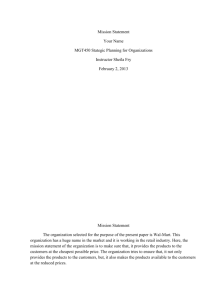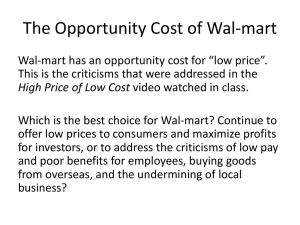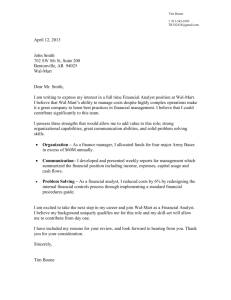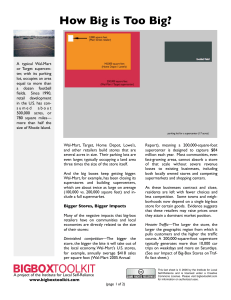Charleston Post Courier, SC 04-29-07 Green Giants
advertisement
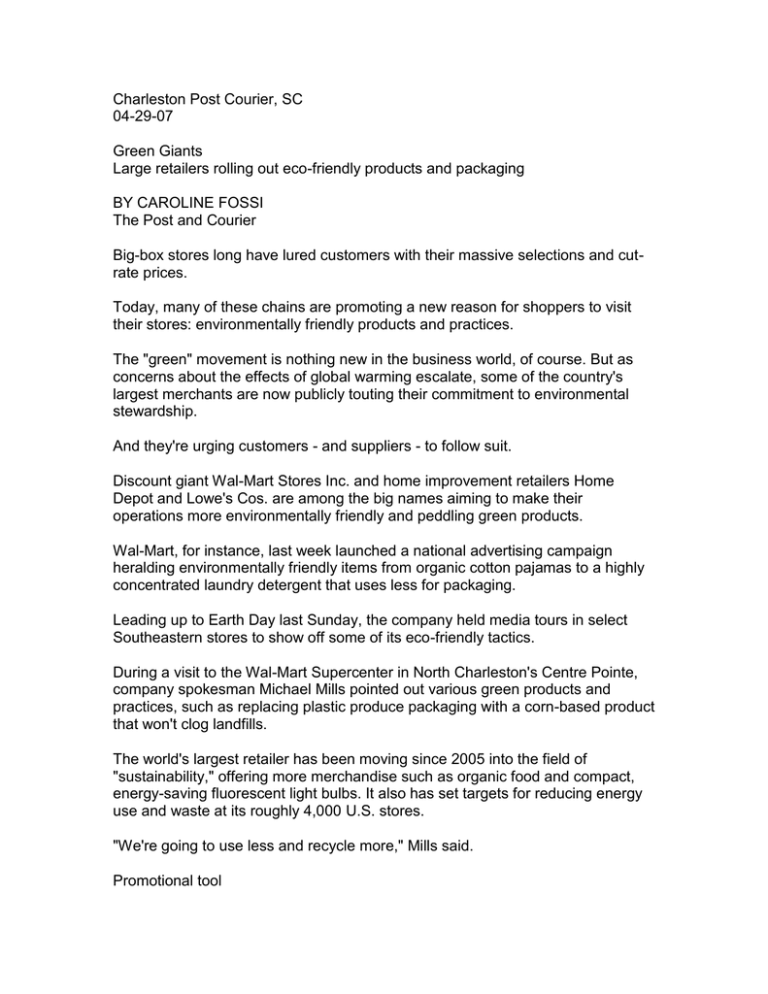
Charleston Post Courier, SC 04-29-07 Green Giants Large retailers rolling out eco-friendly products and packaging BY CAROLINE FOSSI The Post and Courier Big-box stores long have lured customers with their massive selections and cutrate prices. Today, many of these chains are promoting a new reason for shoppers to visit their stores: environmentally friendly products and practices. The "green" movement is nothing new in the business world, of course. But as concerns about the effects of global warming escalate, some of the country's largest merchants are now publicly touting their commitment to environmental stewardship. And they're urging customers - and suppliers - to follow suit. Discount giant Wal-Mart Stores Inc. and home improvement retailers Home Depot and Lowe's Cos. are among the big names aiming to make their operations more environmentally friendly and peddling green products. Wal-Mart, for instance, last week launched a national advertising campaign heralding environmentally friendly items from organic cotton pajamas to a highly concentrated laundry detergent that uses less for packaging. Leading up to Earth Day last Sunday, the company held media tours in select Southeastern stores to show off some of its eco-friendly tactics. During a visit to the Wal-Mart Supercenter in North Charleston's Centre Pointe, company spokesman Michael Mills pointed out various green products and practices, such as replacing plastic produce packaging with a corn-based product that won't clog landfills. The world's largest retailer has been moving since 2005 into the field of "sustainability," offering more merchandise such as organic food and compact, energy-saving fluorescent light bulbs. It also has set targets for reducing energy use and waste at its roughly 4,000 U.S. stores. "We're going to use less and recycle more," Mills said. Promotional tool For its part, Atlanta-based Home Depot is rolling out a program that will help customers identify eco-friendly products in its 2,000-plus stores, including its three Charleston-area locations. The home-improvement retailer said last week it started identifying about 2,800 such items with the tag "Eco Options," including all-natural insect repellents, organic plant food and solar lights. The company plans to double its Eco Options offerings in the next 18 months, said spokesman Tony Wilbert. "What we hope to do is educate consumers and create more of a demand," he said. Home Depot rival Lowe's this year was recognized for its efforts in championing energy-efficient products, receiving an Energy Star award from the U.S. Environmental Protection Agency and Department of Energy. At its 1,300 stores, the Mooresville, N.C.-based chain carries green products such as organic gardening supplies and a decking material made from recycled plastics. Environmentalists and retail experts, in general, applauded the retailers' moves. "I think it's very positive," said Dana Beach, executive director of the Coastal Conservation League in Charleston, a nonprofit environmental watchdog group. "The only way to scale up the (energy) efficiency gains we need is to have them promoted by huge retail outlets." By promoting and prominently displaying eco-friendly merchandise, big-box stores could encourage more customers to try out those products, said Bryan Cordell, executive director of the Sustainability Institute in North Charleston. "People start thinking about it more because they have the choice to," Cordell said. Greenbacks Ben Leigh, project manager for the nonprofit Sustainability Institute, called WalMart's green push a "good first step," but he'd like to see if the company follows through in the long term. With its massive stores that consume huge amounts of energy, "The proof is in the power bill," he said. Retail observers said mass merchandisers' eco-friendly strategies also could help temper some of the negative publicity they've faced in recent years. Indeed, Wal-Mart and its brethren have received heaps of criticism for everything from treating workers unfairly to muscling out local competitors. The environmental campaign "is great for the public image," said Paul Smith, business management professor at Mars Hill College in North Carolina, who has studied sustainability issues. "It's opening the door to people who might have been reluctant to shop (at these chains) because of their business practices," he said. Besides helping Mother Nature and providing a PR boost, the companies say such strategies have an added benefit: They're good for the bottom line. Wal-Mart, for instance, has saved $2.4 million in shipping costs by using smaller packaging, according to a recent report by Bain & Co., a consulting firm. Home Depot is testing a program to recycle its cardboard boxes. The company gets paid for its recycling efforts, said spokesman Wilbert. "It benefits the environment and helps us generate revenue on the back end," he said. Many big retailers also are pushing their vendors to design products and packaging that sustain rather than degrade the environment. Wal-Mart expert Kenneth Stone has seen firsthand evidence of the retail giant's influence on its suppliers' environmental practices. Stone, a retired Iowa State University economics professor, pointed to a recent visit to a produce farm in southern California where he observed a tomatopacking operation. Most of the tomatoes were packed in cardboard boxes, but those destined for Wal-Mart were in black plastic crates, he recalled. "When they reached the store, the crate acted as a display case," said Stone, who has written several research papers on Wal-Mart. "When the tomatoes were sold, the crates were washed, folded and sent back to the farms to be refilled again."
